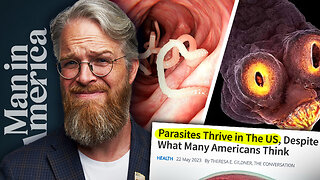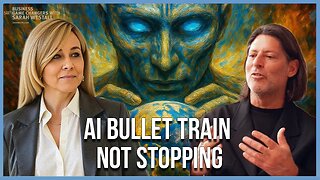Premium Only Content

Episode 3229: Custody of the Eyes: The Gateways of the Soul
Nightly Zoom Coordinates for Rosary:
Meeting ID: 865 8978 0399
Passcode: Wjjv4960!
Speak Lord for your Servant is Listening
Book Recommendation of the Day
The Conferences by St. John Cassian
• Cassian, who lived among the Desert Fathers in Egypt, recorded their wisdom in a way accessible to both monks and laypeople.
• Several of his Conferences deal directly with custody of the eyes, watchfulness of the heart, and the need to discipline the senses to preserve purity and prayer.
• In Conference II (Abba Moses on Purity of Heart), Cassian records:
“If the eyes are not guarded, the heart is quickly defiled. The lamp of the body is the eye; if the eye is dark, the whole body is in darkness.”
• He also explains how distractions and temptations first enter through the senses before they become sins, and how constant vigilance is necessary.
Custody of the Eyes: The Gateways of the Soul
The Desert Fathers were masters of the interior life. They knew that the heart, the place of encounter with God, must be guarded carefully. And they knew that the primary way the enemy seeks to disturb the heart is through the senses especially the eyes.
They taught that the eyes, ears, and tongue are the gateways of the soul. If these gates are left unguarded, temptations and distractions pour in freely, leading to impurity, envy, restlessness, and despair. But if they are carefully watched, the soul remains recollected, prayerful, and at peace.
This discipline, called custody of the eyes or custody of the senses, is almost forgotten in our age but it is more necessary now than ever.
Segment 1: Sayings of the Fathers
The Desert Fathers spoke bluntly about the need to guard the eyes:
• Abba Arsenius, once a tutor to Roman princes, prayed constantly:
“O Lord, teach me to be silent.”
He expanded this to include the eyes, saying: “If we seek to be saved, let us guard our eyes and our tongue; for these are the gateways of the soul.”
• Evagrius of Pontus observed how the senses feed the imagination, which then feeds temptation:
“The demon first attacks through images. Guard your eyes, and you will guard your heart.”
• Abba Isaiah warned against letting the eyes wander:
“The eyes which delight in vanities bring darkness to the soul.”
• Abba Poemen used an image of fire:
“As dry wood is kindled by a spark, so a careless glance enkindles passion in the heart.”
For the Fathers, the issue was not only about avoiding lust, but about keeping the heart undistracted and recollected, so that it remained a temple for God.
Segment 2: Why This Teaching is Urgent Today
If the Desert Fathers were alive today, they would surely tremble at the flood of images and noise that surrounds us.
1. The Age of Screens
Our phones, computers, and televisions bombard us with constant images. Many are impure or immodest, while others are simply distracting, pulling our hearts away from prayer.
2. The Culture of Voyeurism
Modern entertainment encourages us to watch everything: the lives of celebrities, the sins of others, the vanity of the world. The Fathers would call this spiritual gluttony consuming what does not nourish the soul.
3. Social Media Comparisons
Just as the Fathers warned against envy from wandering eyes, today we see the same through scrolling constant comparisons that breed pride or discouragement.
4. Noise Over Silence
Not only the eyes, but the ears: constant music, chatter, and commentary make silence unbearable. The Fathers knew that without silence, prayer dies.
Most Catholics today have never been taught that what we look at, listen to, and speak of shapes the soul. The Fathers remind us: custody of the senses is not optional. It is the foundation of holiness.
Segment 3: Remedies from the Desert Tradition
The Fathers gave concrete remedies for guarding the senses:
1. Turn Away Quickly
Do not linger on what tempts or distracts. Abba Poemen said that averted eyes strengthen the will. Even one act of turning away from vanity is a victory.
2. Moderate Curiosity
The Fathers saw curiosity as dangerous. Abba Moses warned: “He who keeps seeking to know everything will fall into many snares.” For us, this means avoiding gossip, endless scrolling, and seeking entertainment in others’ faults.
3. Fill the Eyes with Holy Things
The Fathers encouraged gazing upon icons, crucifixes, and Scripture. What we look at should elevate the soul. For the laity, this means surrounding our homes with sacramentals and turning our gaze often toward sacred images.
4. Guard Times of Silence
Silence is not emptiness, but space for God. The Fathers advised deliberate periods of quiet, cutting off distractions. Today, that might mean fasting from screens, creating silent hours in the home, or praying in a quiet chapel.
5. Daily Examination of Senses
They taught examining the heart each evening: “What entered my soul today through my eyes, ears, and tongue? Did it lead me toward Christ or away from Him?”
Segment 4: The Fruits of Custody
The Desert Fathers testified that guarding the senses bore great fruit:
• Purity of Heart: The soul remains unclouded, able to see God clearly.
• Peace: No longer agitated by vanities, the heart rests in prayer.
• Recollection: The mind becomes still, focused on Christ, not scattered by distractions.
• Freedom: Custody of the eyes liberates us from slavery to passions and frees us for love.
• Joy in God: When the soul is not flooded with images of the world, it delights in the beauty of divine things.
Christ Himself said: “The lamp of the body is the eye. If your eye is sound, your whole body will be full of light.” (Matthew 6:22).
Conclusion: The Call to Watchfulness
The Desert Fathers knew that holiness begins with watchfulness. They remind us that what we allow through the senses shapes the soul.
If the eyes are pure, the soul is filled with light. If the eyes wander, the soul grows dark. In an age of constant distraction, their wisdom is a lifeline: guard the eyes, guard the ears, guard the tongue — and you will guard the heart.
This discipline is not repression, but freedom: freedom from the slavery of sin, and freedom to gaze on God with an undivided heart.
Epistle – Ephesians 3:13–21
"That Christ may dwell by faith in your hearts; that being rooted and founded in charity, you may be able to comprehend with all the saints what is the breadth, and length, and height, and depth: to know also the charity of Christ, which surpasseth all knowledge."
Reflection on the Epistle
St. Paul prays that the faithful would be strengthened interiorly, with Christ dwelling in their hearts. The foundation of the Christian life is not merely external observance, but interior transformation rooted in charity. True charity is not sentimental it is sacrificial, flowing from Christ crucified.
This reading is beautifully illustrated in the life of St. Wenceslaus. Though a ruler with temporal power, he was rooted in charity: feeding the poor, building churches, and promoting the faith in his land. His strength was not in armies or wealth, but in Christ dwelling in him. His martyrdom at the hands of his own brother shows us that authentic charity often leads to the Cross, but also to eternal glory.
For us, this reading is a challenge: are we rooted in charity? Or do we rely on human strength, status, or pride? St. Paul’s words call us to allow Christ’s charity to fill every dimension of our lives, so that, like Wenceslaus, we may radiate Him to the world.
Gospel – Luke 13:1–13
"Unless you shall do penance, you shall all likewise perish... And He spoke also this parable: A certain man had a fig tree planted in his vineyard, and he came seeking fruit on it and found none. And he said to the dresser of the vineyard: Behold, for three years I come seeking fruit on this fig tree and I find none. Cut it down therefore; why cumbereth it the ground? But he answering, said to him: Lord, let it alone this year also, until I dig about it, and dung it. And if happily it bear fruit: but if not, then after that thou shalt cut it down."
Reflection on the Gospel
Here Christ makes clear the urgency of conversion. Tragedies and sudden deaths remind us that life is uncertain, and only repentance prepares us for eternity. The parable of the barren fig tree is a dramatic image of the soul that remains unfruitful: outwardly alive, but spiritually barren.
Yet notice the mercy of God: the vinedresser pleads for time, offering to cultivate and fertilize the tree once more. This is the mercy of Christ, interceding for us, giving us time for repentance. But the warning is real time is limited, and a fruitless tree will eventually be cut down.
For traditional Catholics, this Gospel challenges us to ensure that our fidelity to the liturgy and doctrine is not barren of fruit. Tradition is not a museum piece it must bear the fruit of holiness, conversion, and charity. St. Wenceslaus bore such fruit in his governance, his devotion, and his martyrdom.
Feast of St. Wenceslaus
St. Wenceslaus, Duke of Bohemia, ruled with justice and holiness. He cared for the poor with his own hands, built churches, and supported the mission of the Church. His devotion to the Blessed Sacrament and the liturgy nourished his soul. Betrayed by his brother Boleslaus, he was slain while going to Mass. His martyrdom sealed a life of Christian witness, making him a patron of rulers, of Bohemia, and of all those who strive to unite faith with daily duty.
Application for Today
• Be rooted in charity: Let Christ dwell in your heart through prayer, the sacraments, and sacrifice.
• Live repentance daily: Confess your sins, amend your life, and bear fruit worthy of the Gospel.
• Imitate St. Wenceslaus: Whatever your vocation, live it with justice, humility, and devotion to the poor.
• Do not presume on mercy: God gives time, but not unlimited time. Now is the day to begin anew.
________________________________________
Conclusionary Prayer
O God, who didst strengthen St. Wenceslaus with faith and charity, and crown his earthly rule with martyrdom, grant that we, rooted in Thy love, may repent of our sins, bear fruit in holiness, and be ready to meet Thee at Thy coming. Through the intercession of St. Wenceslaus, may we persevere in fidelity to Tradition, love of neighbor, and devotion to Christ our King.
St. Wenceslaus, pray for us.
Sacred Heart of Jesus, have mercy on us.
Immaculate Heart of Mary, intercede for us.
-
 9:25
9:25
MattMorseTV
1 day ago $11.77 earnedSupreme Court just DROPPED a NUKE.
15.2K62 -
 13:25
13:25
Nikko Ortiz
1 day agoWorst Karen TikTok Fails
15K10 -
 40:24
40:24
The Connect: With Johnny Mitchell
2 days ago $19.64 earnedInside The WORST Drug-Infested Slums Of Medellin, Colombia
59.3K29 -
 4:14
4:14
GritsGG
15 hours ago2 Warzone Easter Eggs! How to Find Them EASILY!
16K1 -
 LIVE
LIVE
Lofi Girl
2 years agoSynthwave Radio 🌌 - beats to chill/game to
354 watching -
 1:45:43
1:45:43
Man in America
15 hours agoThe DISTURBING Truth About Parasites — Live Q&A w/ Dr. Jason Dean
76.1K39 -
 7:13:47
7:13:47
SpartakusLIVE
11 hours ago#1 Mountain of Muscle with HUGE Legs saves your weekend from complete BOREDOMNight HYPE
45.3K1 -
 47:42
47:42
Sarah Westall
12 hours agoFreedom or Slavery? AI will Change Everything w/ Trump Senior Advisor Marc Beckman
61.7K14 -
 2:23:20
2:23:20
vivafrei
19 hours agoEp. 285: Visa Revocation No-Go! Sortor Arrested! Ostrich Crisis! 2A Win! Comey Defense & MORE!
119K116 -
 5:55:11
5:55:11
CassaiyanGaming
9 hours ago🟢LIVE - VISITING GOOB LAGOON! - Will They Rip Me Off?!? Waterpark Simulator
44.1K4
